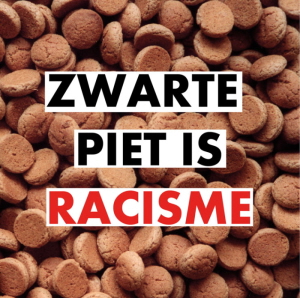The Dutch government’s commitment to anti-discrimination is a sham!

Last year Doorbraak activist Jennifer van Leijen initiated a campaign to stop the Dutch government from subsidizing blackface (Zwarte Piet or Black Pete) on children’s television. Over 8,000 people already signed. Van Leijen regularly writes updates. Here is number 8 (also read numbers 1, 2, 3, 4, 5 and 6/7).
Even when racism sells, schools shouldn’t buy it. Despite having committed themselves to anti-discrimination in education, the Dutch state remains subsidising a racist children’s television programme targeted at schools. The Netherlands adopted an anti-discrimination policy recommendation on 15th december 2006. The document, published by the European Commission against Racism and Intolerance, called “General Policy Recommendation nr. 10”, lists ways in which racism and discrimination can be combatted in education. The general policy document recalls the importance of “ensuring that school textbooks and other teaching aids not spread prejudice and stereotypes”.
The Dutch racist children’s television programme (features blackfacing) is made by the NTR, specifically for use by schools. The NTR even sell a lesson packet accompanying the programme, to schools. There are therefore commercial interests involved. If the Dutch government were serious about their commitment to combat racism and racial discrimination, they wouldn’t subsidise the NTR who have been making this programme since 2001!
The blackfacing in these racist children’s television programmes is accompanied by racist stereotyping in the characterisation and story line. The policy recommendation specifies “removing from textbooks any racist material or material that encourages stereotypes, intolerance or prejudice against any minority group”; but that should apply to all materials, not only books.
The general policy recommendation includes “promoting critical thinking among pupils and equipping them with the necessary skills to become aware of and react to stereotypes or intolerant elements contained in material they use”; but this is not happening. The programme makers have consistently revealed in their various statements, and in the storylines, that they are ignorant about and indifferent to the issue of racist discrimination.
The director, Ajé Boschhuizen, who has also worked for the Dutch version of “Sesame Street”, seems thrilled that the controversy surrounding the subject has lead to higher television viewership ratings. This illustrates the reality of Dutch commercial pragmatism: human rights are only respected when there is no commercial disadvantage. But when racism sells, you don’t expect schools to buy it.
The Dutch government adopted the general policy recommendation that recognises that racist discrimination has “harmful consequences for children and society as a whole”;… and goes on to state that “the prohibition of discrimination should apply to all public authorities as well as to all natural or legal persons, both in the public and in the private sectors”. The Dutch government’s commitment to anti-discrimination is a sham!
Jennifer van Leijen
